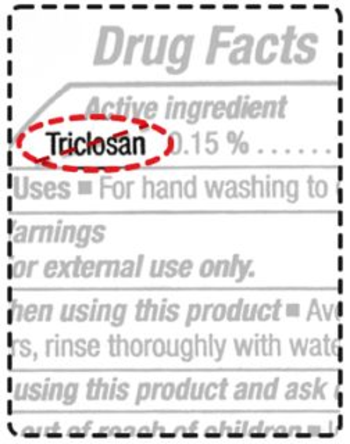Triclosan legislation passes

Triclosan will soon begin to be removed from soap and body wash products in Minnesota.
Photo: Wikimedia Commons
In a major victory for environmental quality and public health, the Minnesota Legislature voted in favor of a bill that makes Minnesota the first state in the nation to prohibit the sale of cleaning products containing triclosan that are used by consumers for hand and body cleansing, effective January 1, 2017.
This was FMRs primary legislative priority this session, and a tremendous step forward for the Mississippi River.
Background
Triclosan is a common additive in many antibacterial soaps and personal care items like toothpaste, deodorant, fabric, kitchenware and cosmetics. Human exposure to this harmful chemical is becoming more common and about 75 percent of Americans test positive for triclosan in their urine. Triclosan has been linked to increased allergy susceptibility, and may pose risks to healthy human and animal reproduction, hormone development, and muscle function.
When wastewater from our homes containing triclosan is treated and returned to our waterways, the triclosan forms cancer-causing compounds called "dioxins." These cancer-causing compounds have increased by 200-300 percent in the Mississippi River since the 1960s. Similar impacts are found in Minnesota lakes.
According to the U.S. Food & Drug Administration, there is no evidence that triclosan provides any health benefit to consumers. As a result of these risks and the superiority of alternative products already on the market, FMR reached out to a number of partners to advance legislation to phase out the sale of triclosan in select consumer products.
A rocky road: How it passed
The triclosan phase-out legislation followed a rocky road through this year's legislative session. A bill was introduced by Representative Diane Loeffler (DFL - 60A) to phase out the sale of triclosan-based soaps and body cleaning products effective January 1, 2016. This bill (HF 2772) received bipartisan support at the capitol and was supported by the Minnesota Medical Association, the University of Minnesota Center for Infectious Disease Research & Policy, and many in the environmental and public health communities.
After passage in the Health and Human Services Committee, the bill stalled due to opposition in the House Environmental & Natural Resources Policy committee by chair Rep. David Dill (DFL - 3A). Representative Loeffler attempted to amend the triclosan language to the Health Omnibus Policy Bill, but legislators blocked that move on May 5, responding to concerns from Minnesota's own Ecolab.
A compromise solution
Following that defeat, FMR worked with Ecolab, the soap industry, public health experts, and state legislators to negotiate compromise language to narrow the scope to just consumer cleaning products used for hand and body cleansing, with an effective date of January 1, 2017. While FMR hoped for a 2015-2016 effective date, we were able to secure some industry support through this compromise language.
The revised triclosan bill was proposed as an amendment for SF 2192 and considered on the floor of the MN House of Representatives on Thursday, May 8. The amendment was adopted by a 101-29 vote.
The House and Senate Conference Committee met on May 12 to work out differences in the House and Senate versions of the SF 2192. During this committee, the members voted unanimously to include the triclosan language in the final conference report. The final language was then sent to the floor of both chambers for final passage.
The final votes
The Senate passed the final bill on May 13, 2014 by a vote of 58-0. The House passed the final bill on May 14, 2014 by a vote of 110-19. Governor Dayton is expected to sign the bill into law, making Minnesota the first state to adopt a phase-out of triclosan in consumer hand soap and body washes in the nation.
A grassroots victory
FMR wishes to thank all of our partners and friends who made this victory possible. More than 900 Minnesotans signed our petition in favor of this bill, and nearly 400 people personally contacted their legislators asking them to support this initiative.
We are also grateful for the support and cooperation of the Minnesota Environmental Partnership, Conservation Minnesota, the University of Minnesota Center for Infectious Disease Research & Policy, Healthy Food Action, The Minnesota Medical Association, Rep. Diane Loeffler, Sen. John Marty, Rep. Melissa Hortman, Rep. Jean Wagenius, Rep. Rick Hansen, Rep. Joe Atkins, Rep. Denny McNamara, Rep. Erin Murphy, Rep. Paul Thissen, and the 168 bipartisan legislators who voted in favor of this language.
For more information on this legislative victory, please contact FMRs Water Program Director Trevor Russell at trussell@fmr.org or (651) 222-2193 x18.